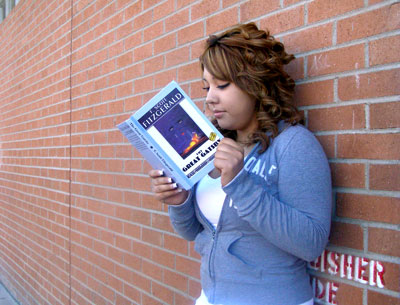All Nonfiction
- Bullying
- Books
- Academic
- Author Interviews
- Celebrity interviews
- College Articles
- College Essays
- Educator of the Year
- Heroes
- Interviews
- Memoir
- Personal Experience
- Sports
- Travel & Culture
All Opinions
- Bullying
- Current Events / Politics
- Discrimination
- Drugs / Alcohol / Smoking
- Entertainment / Celebrities
- Environment
- Love / Relationships
- Movies / Music / TV
- Pop Culture / Trends
- School / College
- Social Issues / Civics
- Spirituality / Religion
- Sports / Hobbies
All Hot Topics
- Bullying
- Community Service
- Environment
- Health
- Letters to the Editor
- Pride & Prejudice
- What Matters
- Back
Summer Guide
- Program Links
- Program Reviews
- Back
College Guide
- College Links
- College Reviews
- College Essays
- College Articles
- Back
Maybe We Need More Gatsby
“We shook hands and I started away. Just before I reached the hedge I remembered something and turned around. ’They’re a rotten crowd,’ I shouted across the lawn. ‘You’re worth the whole damn bunch put together.’”
So often in childhood we are blasted with these grand ideas of the “American Dream.” We hear stories of our hopeful ancestors immigrating to a newly burgeoning United States of America, of a frontier in the 19th century abounding with riches waiting to be staked, of industrial greats like Andrew Carnegie who proved that coming from humble beginnings only made achievement through hard work and determination that much greater. Consequently, the “American Dream” is an ideal that we all can aspire to, a longing for success that we, ourselves, can bring and push us down the path towards happiness.
However, F. Scott Fitzgerald’s euphoric portrayal of New York during the Roaring Twenties, of an American people entranced in the luster of lavish parties and material wealth, of a man of the newfangled, jubilant class of the filthy rich—the West Egg-—and his tragic pursuit to transform himself, win his love, and achieve the “American Dream,” drew ill light to the fantasy that might be our daily lives. Gatsby, devoting himself so tirelessly to acquiring the fortune and grandeur necessary to win over Daisy, had seen his incorruptible dream, in fact, corrupted by those around him driven by a blind pursuit of wealth and adventure. Perhaps most tragically, his death, the symbolic death of the “American Dream” itself, came at the hands of a man in George Wilson, who as with the rest of the “valley of ashes” had been cruelly consumed and spit back out by this new industrial, materialistic America.
I hold off on saying so emphatically that materialism, itself, killed the “American Dream.” It saturated it, no doubt. To a certain extent, the “American Dream” has always been towards attaining wealth, which could then bring the added benefits of more power in America, of security for one’s family, of a certain self-dependence that simply could not be felt as an industrial worker living paycheck to paycheck. And Gatsby, by no means a noble man at birth, was successful in this venture, albeit through slightly criminal means, in creating a fabulously wealthy version of himself, whose opulence and mystique would do well to draw the intrigue of any woman. Yet, from partygoers’ questions about his true origins, to a struggle between those of the East Egg, generational, classy elite, and those new to wealth of the West Egg, to Daisy’s failure to accept him in the end, we see this identity rejected time and time again, leaving behind a shell of a man who neither was, nor wasn’t, Jay Gatsby.
Instead, I contest that we killed the “American Dream.” In our eagerness to accept the consumer culture, to be so grossly elated by the fruits of the new industrial world, we’ve struck upon a century-long, inexhaustible passion for money, luxurious cars, expensive phones, and all things brand-name. Most are, at the very least, unnecessary and, at the worst, an attempt to prove ourselves more affluent. And while our voracity for material comfort sure plays well into the hands of corporations, what room is left for dreams beyond money, of family, of love, of self-improvement, the creation of a lasting impact on society, of a dream like Gatsby’s? And even in a country that has seen a disturbing decrease in social mobility and consequent increase in the pleas from movies and books, internet blogs and Facebook posts, Psychology textbooks and English classroom discussions of the importance of other things but money in people’s lives, the pursuit of money in choosing a career remains to be one of the highest motivating factors in high-school and college students, an innumerable amount of Americans would tritely call money the prime bringer of happiness, and the great “American Dream” has become, whether we like it or not, restricted to and synonymous with, as my nine-year old brother answered, “making money.” Whereas, we’ve decided that money should be one of the prime pursuits in our lives, Gatsby had a dream far bigger than that, to which the grasp of wealth was only a means.
For every bit of blame that the rise of materialism, itself, holds in the fate of Jay Gatsby and the “American Dream,” our reluctance to look beyond the money, our undeniable similarities to the multitude of people of Fitzgerald’s Long Island, was the nail in the coffin. Gatsby was, indeed, a man consumed by his fostered identity; need to express his wealth through extravagant festivities, and unadulterated love for Daisy. However, his one redeeming quality was his unending pursuit. We mustn’t let the downfall of one man and his dream spell the end of all others.

Similar Articles
JOIN THE DISCUSSION
This article has 0 comments.
